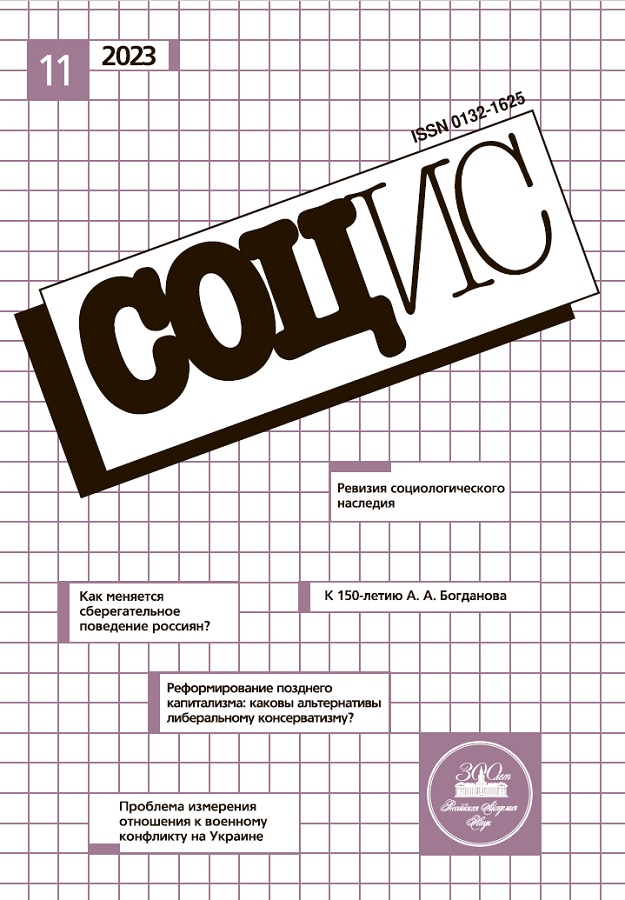Typological Groups of First-Year Students by Educational Strategies in Conditions of Individual Learning Trajectories
- Авторлар: Gavrilyuk T.V.1, Bocharov V.Y.1, Pogodaeva T.V.1
-
Мекемелер:
- University of Tyumen
- Шығарылым: № 11 (2023)
- Беттер: 93-104
- Бөлім: Articles
- URL: https://cijournal.ru/0132-1625/article/view/661989
- DOI: https://doi.org/10.31857/S013216250028535-1
- ID: 661989
Дәйексөз келтіру
Аннотация
The typological analysis of the first-year students’ educational strategies in the conditions of experimental learning within individual learning pathways have been considered in the article. Using the heuristic potential of the typological approach in relation to the data of a mass questionnaire survey of first-year students at the Tyumen State University, two parts of type-forming features were identified and the corresponding empirical indicators were formed. Using the methods of factorial and cluster analysis, three modal typological groups of first-year students have been discerned, and each of them has its own educational strategy at the university. Conclusions have been drawn about the expediency of building such a typology at the beginning of the student's educational pathway, as this enable to make timely management decisions on the development of desirable and correction of undesirable learning strategies, as well as the possibility of further monitoring measurements.
Авторлар туралы
Tatiana Gavrilyuk
University of TyumenTyumen, Russia
Vladislav Bocharov
University of TyumenTyumen, Russia
Taisia Pogodaeva
University of TyumenTyumen, Russia
Әдебиет тізімі
- Амбарова П.А., Зборовский Г.Е. Пути к успешности в образовании: поведенческие стратегии студенчества в региональных вузах России // Высшее образование в России. 2021. Т. 30. № 11. С. 64–80. doi: 10.31992/0869-3617-2021-30-11-64-80.
- Бурдьё П., Пассрон Ж.-К. Воспроизводство: элементы теории системы образования. Пер. с франц. Н.А. Шматко. М.: Просвещение, 2007.
- Васенина И.В., Липатова М.Е., Сушко В.А. Профессиональные и образовательные стратегии современных абитуриентов // Вестник Московского ун-та. Сер. 18. Социология и политология. 2019. № 25(4). С. 102–123. doi: 10.24290/1029-3736-2019-25-4-102-123.
- Гаврилюк В.В. Образование и профессиональный выбор рабочей молодежи // Жизненные стратегии молодежи нового рабочего класса. М.: Флинта, 2020. С. 201–235.
- Гасанова Р.Р. Разработка и осуществление персональных траекторий образования педагогов в дополнительном образовании // Профессиональное образование в современном мире. 2021. Т. 11. № 1. С. 125–135. doi: 10.20913/2618-7515-2021-1-21.
- Дробышева Е.Э. Образовательные стратегии эпохи креативности // Культура и образование. 2018. № 4(31). С. 5–12.
- Куликова О.В., Сиухина Е.А., Тимофеева Л.В. Разработка образовательных траекторий спортсменов в рамках реализации компетентностного подхода и внедрения образовательных стандартов высшего образования // Управление в XXI веке: сб. ст. по мат. Междунар. науч.-практ. конф. Белгород, 2016. С. 31–33.
- Мальцева В.А., Розенфельд Н.Я. Траектории российской молодежи в образовании и профессии на материале лонгитюда: сложные маршруты выпускников вузов // Вопросы образования. 2022. № 3. С. 99–148. doi: 10.17323/1814-9545-2022-3-99-148.
- Мартынова Е.А. Построение индивидуальной образовательной траектории лиц с ограниченными возможностями здоровья и инвалидов, обучающихся в профессиональных образовательных организациях // Научный альманах. 2017. № 6-1. С. 156–160. doi: 10.15826/umpa.2017.03.041.
- Новые смыслы в образовательных стратегиях молодежи: 50 лет исследования. М.: ЦСПиМ, 2015.
- Татарова Г.Г. Основы типологического анализа в социологических исследованиях. М.: ВШЭ, 2007.
- Терентьев К.Ю. Образовательные стратегии российской молодежи: к построению типологии // Вестник СПбГУ. Социология. 2016. № 2. С. 17–27. doi: 10.21638/11701/spbu12.2016.202.
- Типологический анализ в социологии как диагностическая процедура / Отв. ред. Г.Г. Татарова, А.В. Кученкова. М.: ФНИСЦ РАН, 2023.
- Фурсов К.С. Образовательные стратегии студентов российских вузов на этапе выхода на рынок труда: опыт эмпирического исследования // Вопросы образования 2006. №2. С. 222–241.
- Barg K. Educational Choice and Cultural Capital: Examining Social Stratification within an Institutionalized Dialogue between Family and School // Sociology. 2015. No. 49(6). P. 1113–1132. doi: 10.1177/0038038514562854.
- Endres T., Leber J., Böttger C. et al. Improving Lifelong Learning by Fostering Students’ Learning Strategies at University // Psychology Learning & Teaching. 2021. No. 20(1). P. 144–160. doi: 10.1177/1475725720952025.
- Hindhede A.L. Medical students’ educational strategies in an environment of prestige hierarchies of specialties and diseases // British Journal of Sociology of Education. 2020. Vol. 41. Iss. 3. P. 315–330. doi: 10.1080/01425692.2019.1703645.
- Jackson P.B., Berkowitz A. The structure of the life course: gender and racioethnic variations in the occurrence and sequencing of role transitions // Advances in Life Course Research. 2005. Vol. 9. Special Issue: The Structure of the Life Course: Standardized? Individualized? Differentiated? P. 55–90.
- Lane M. Explaining Educational Choice // Sociology. 1972. No. 6(2). P. 255–266. doi: 10.1177/003803857200600206.
- Pitzalis M., Porcu M. Cultural capital and educational strategies. Shaping boundaries between groups of students with homologous cultural behaviours // British Journal of Sociology of Education. 2017. Vol. 38. Iss. 7. P. 956–974. doi: 10.1080/01425692.2016.1205968.
- Pogosyan M.A. Development of individual learning paths system in engineering education // 2020 IEEE Frontiers in Education Conference (FIE). P. 1–8. doi: 10.1109/fie44824.2020.9274140.
- Salinas J., Benito B. Construction of personalized learning pathways through mixed methods // Comunicar. 2020. Vol. 28. No. 65. P. 31–41. doi: 10.3916/C65-2020-03.
- Schaffer E.C., Stringfield S., Reynolds D., Schaffer J. Opportunity and Justice: Building a Valuable and Sustainable Educational Experience for Disenfranchised and Disengaged Youth // Power and Education. 2013. No. 5(1). P. 52–63. doi: 10.2304/power.2013.5.1.52.
- Tsatsaroni A., Sarakinioti A. Thinking flexibility, rethinking boundaries: Students’ educational choices in contemporary societies // European Educational Research Journal. 2018. No. 17(4). P. 507–527. doi: 10.1177/1474904117744697.
- Varjo J., Kalalahti M., Jahnukainen M. The reasoning behind the envisioned educational trajectories of young people from Finnish and immigrant origins // Education Inquiry. 2020. Vol. 11. Iss. 4: Transitions and career learning: youth and governance perspectives. P. 360-378. doi: 10.1080/20004508.2020.1716552.
- van de Werfhorst, Herman G., Andersen R. Social Background, Credential Inflation and Educational Strategies // Acta Sociologica. 2005. Vol. 48, No. 4. P. 321–340.
- Wong B., Chiu Y.-Li.T. Swallow your pride and fear’: the educational strategies of high-achieving non-traditional university students // British Journal of Sociology of Education. 2019. Vol. 40. Iss. 7. P. 868–882. doi: 10.1080/01425692.2019.1604209.
Қосымша файлдар









